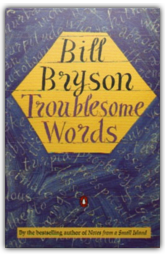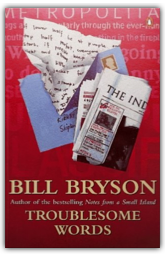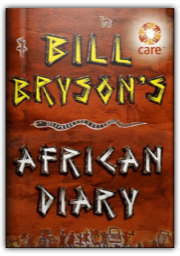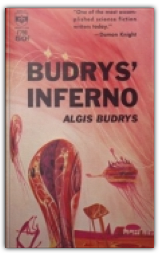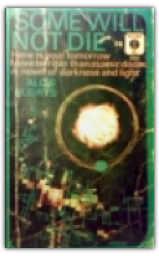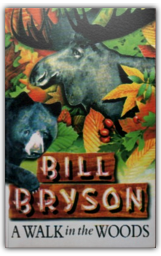 A Walk in the Woods
Bill Bryson
A Walk in the Woods
Bill Bryson
Bill Bryson has made a living out of travelling and then writing about it. In The Lost Continent he re-created the road trips of his childhood; in Neither Here nor There he retraced the route he followed as a young backpacker traversing Europe. When this American transplant to Britain decided to return home, he made a farewell walking tour of the British countryside and produced Notes from a Small Island. Once back on American soil and safely settled in New Hampshire, Bryson once again hears the siren call of the open road—only this time it's a trail. The Appalachian Trail, to be exact. In A Walk in the Woods Bill Bryson tackles what is, for him, an entirely new subject: the American wilderness. Accompanied only by his old college friend Stephen Katz, Bryson starts out one March morning in north Georgia, intending to walk the entire 2,100 miles to the trail's end atop Maine's Mount Katahdin.
If nothing else, A Walk in the Woods is proof positive that the journey is the destination. As Bryson and Katz haul their out-of-shape, middle-aged bodies over hill and dale, the reader is treated to both a very funny personal memoir and a delightful chronicle of the trail, the people who created it, and the places it passes through. Whether you plan to make a trip like this one yourself one day or only care to read about it, A Walk in the Woods is a great way to spend an afternoon. —Alix Wilber
 Notes from a Big Country
Bill Bryson
Notes from a Big Country
Bill Bryson
"Here's a fact for you. According to the latest "Abstract of the United States", every year more than 400,00 Americans suffer injuries involving beds, mattresses or pillows...That is more people than live in greater Coventry. That is almost 2,000 bed, mattress or pillow injuries a day. In the time it takes you to read this article, four Americans will somehow manage to be wounded by their bedding." Fans of Bill Bryson will know by now that this is the kind of completely useless information that gets him excited. In fact, you are unlikely to read anyone else who derives quite so much pleasure from meaningless statistics. If those statistics are about the USA (Bryson's homeland) or his adopted England—or even better, comparing one to the other—then he is in heaven. And it is not only the uselessness of the information that interests him, but also the fact that Americans spend millions of dollars and hours each year collecting such data together.
Though not a match for his earlier success of Notes from a Small Island, Notes from a Big Country takes a good second place. It collects together more than 18 months worth of Mail on Sunday columns which Bryson wrote between October 1996 and May 1998 after he and his English wife and children returned to the US and settled in New England. The only thing that outshines his amazement—and sometimes, outright dismay—at the way American society has changed while he's been away, is his English-born family's instant embracing of transatlantic culture.
A word of warning: reading Bill Bryson is not a spectator sport...you are invited— in fact, compelled—to marvel at how the nation that "has the largest economy, the most comfortably off people, the best research facilities, many of the finest universities and think-tanks, and more Nobel Prize winners than the rest of the world put together" could be the same nation where "13 per cent of women...cannot say whether they wear their tights under their knickers or over them. That's something like 12 million women walking around in a state of chronic foundation garment uncertainty." This is Bryson at his best, and though not every column inch hits the heady heights of underwear distribution, there are enough laugh-out-loud moments to keep you satisfied.
Detractors of Bryson's work complain all his books are the same, yet dedicated followers cite that very uniformity of style and subject as the reason they return, book after book. Anyone disappointed by A Walk in the Woods (Bryson's account of hiking the Appalachian Trail and not his best book) will have their faith restored by Notes from a Big Country— here Bryson returns to his favourite subject and the simple, journalistic prose that makes his wacky facts and observations instantly accessible.
Bryson does not pretend to deliver an intellectual treatise on the state of mankind; instead he offers one man's take on how humanity lurches from one day to another—ironically through the kinds of details he mocks others for collecting. —Lucie Naylor
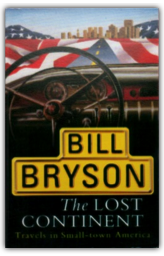 The Lost Continent
Bill Bryson
The Lost Continent
Bill Bryson
A travelogue by Bill Bryson is as close to a sure thing as funny books get. The Lost Continent is no exception. Following an urge to rediscover his youth (he should know better), the author leaves his native Des Moines, Iowa, in a journey that takes him across 38 states. Lucky for us, he brought a notebook.
With a razor wit and a kind heart, Bryson serves up a colourful tale of boredom, kitsch, and beauty when you least expect it. Gentler elements aside, The Lost Continent is an amusing book. Here's Bryson on the women of his native state: "I will say this, however—and it's a strange, strange thing—the teenaged daughters of these fat women are always utterly delectable ... I don't know what it is that happens to them, but it must be awful to marry one of those nubile cuties knowing that there is a time bomb ticking away in her that will at some unknown date make her bloat out into something huge and grotesque, presumably all of a sudden and without much notice, like a self- inflating raft from which the pin has been yanked."
Yes, Bill, but be honest: what do you really think?
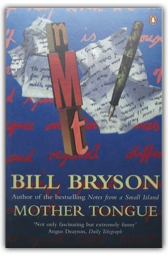 Mother Tongue
Bill Bryson
Mother Tongue
Bill Bryson
Who would have thought that a book about the English language would be so entertaining? Certainly not this grammar-allergic reviewer, but The Mother Tongue pulls it off admirably. Bill Bryson—a zealot—is the right man for the job. Who else could rhapsodise about "the colourless murmur of the schwa" with a straight face? It is his unflagging enthusiasm, seeping from between every sentence, that carries the book.
Bryson displays an encyclopedic knowledge of his topic, and this inevitably encourages a light tone; the more you know about a subject, the more absurd it becomes. No jokes are necessary, the facts do well enough by themselves, and Bryson supplies tens per page. As well as tossing off gems of fractured English (from a Japanese eraser: "This product will self- destruct in Mother Earth."), Bryson frequently takes time to compare the idiosyncratic tongue with other languages. Not only does this give a laugh (one word: Welsh), and always shed considerable light, it also makes the reader feel fortunate to speak English.
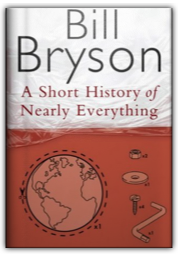 A Short History of Nearly Everything
Bill Bryson
A Short History of Nearly Everything
Bill Bryson
What on earth is Bill Bryson doing writing a book of popular science—A Short History of Almost Everything? Largely, it appears, because this inquisitive, much-travelled writer realised, while flying over the Pacific, that he was entirely ignorant of the processes that created, populated and continue to maintain the vast body of water beneath him.
In fact, it dawned on him that "I didn't know the first thing about the only planet I was ever going to live on". The questions multiplied: What is a quark? How can anybody know how much the Earth weighs? How can astrophysicists (or whoever) claim to describe what happened in the first gazillionth of a nanosecond after the Big Bang? Why can't earthquakes be predicted? What makes evolution more plausible than any other theory? In the end, all these boiled down to a single question—how do scientists do science? To this subject Bryson devoted three years of his life, reading books and journals and pestering the people who know (or at least argue about it); and we non-scientists should be pretty grateful to him for passing his findings on to us.
Broadly, his investigations deal with seven topics, all of enormous interest and significance: the origins of the universe; the gradual historical discovery of the size and age of the earth (and the beginnings of the awesome notion of deep time); relativity and quantum theory; the present and future threats to life and the planet; the origins and history of life (dinosaurs, mass extinctions and all); and the evolution of man. Within each of these, he looks at the history of the subject, its development into a modern discipline and the frameworks of theory that now support it. This is a pretty broad brief (life, the universe and everything, in fact), and it's a mark of Bryson's skill that he is able to carve a clear path through the thickets of theory and controversy that infest all these disciplines, all the while maintaining a cracking pace and a fairly judicious tone without obvious longueurs or signs of haste. Even readers fairly familiar with some or all of these areas of discourse are likely to learn from A Short History. If not, they will at least be amused—the tone throughout is agreeable, mingling genuine awe with a mild facetiousness that often rises to wit.
One compelling theme that appears again and again is the utter unpredictability of the universe, despite all that we think we know about it. Nervous page-turners may care to omit the sensational chapters on the possible ways in which it all might end in disaster—Bryson enumerates with cheerful relish the kind of event that makes you want to climb under the bedclothes: undetectable asteroid colliding with the earth; superheated magma chamber erupting in your back garden; ebola carrier getting off a plane in London or New York; the HIV virus mutating to prevent its destruction in the mosquito's digestive system. Indeed, the chief theme of this sprightly book is the miraculous unlikeliness, in a universe ruled by randomness, of stability and equilibrium—of which one result is ourselves and the complex, fragile planet we inhabit. —Robin Davidson
|
 A Walk in the Woods
Bill Bryson
A Walk in the Woods
Bill Bryson
 Notes from a Big Country
Bill Bryson
Notes from a Big Country
Bill Bryson
 The Lost Continent
Bill Bryson
The Lost Continent
Bill Bryson
 Mother Tongue
Bill Bryson
Mother Tongue
Bill Bryson
 A Short History of Nearly Everything
Bill Bryson
A Short History of Nearly Everything
Bill Bryson
 Made with Delicious Library
Made with Delicious Library
